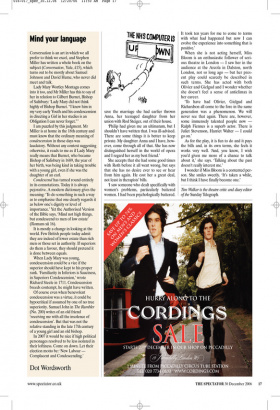save the marriage she had earlier thrown Anna, her teenaged
daughter from her union with Rod Steiger, out of their house.
‘Philip had given me an ultimatum, but I shouldn’t have written that. I was ill-advised. There are some things it is better to keep private. My daughter Anna and I have, however, come through all of that. She has now distinguished herself in the world of opera and I regard her as my best friend.’ She accepts that she had some good times with Roth before it all went wrong, but says that she has no desire ever to see or hear from him again. He cost her a great deal, not least in therapists’ bills.
‘I saw someone who dealt specifically with women’s problems, particularly battered women. I had been psychologically battered. It took ten years for me to come to terms with what had happened but now I can evolve the experience into something that is positive.’ When she is not acting herself, Miss Bloom is an enthusiastic follower of serious theatre in London — I saw her in the audience at the Arcola in Dalston, north London, not so long ago — but her present play could scarcely be described in such terms. She has acted with both Olivier and Gielgud and I wonder whether she doesn’t feel a sense of anticlimax in her career.
‘To have had Olivier, Gielgud and Richardson all come to the fore in the same generation was a phenomenon. We will never see that again. There are, however, some immensely talented people now Ralph Fiennes is a superb actor. There is Juliet Stevenson, Harriet Walter — I could go on.’ As for the play, it is fun to do and it pays the bills and, in its own terms, she feels it works very well. ‘And, you know, I wish you’d given me more of a chance to talk about it,’ she says. ‘Talking about the past doesn’t really interest me.’ I wonder if Miss Bloom is a contented person. She smiles sweetly. ‘It’s taken a while, but I think I have finally become one.’ Tim Walker is the theatre critic and diary editor of the Sunday Telegraph.




































 Previous page
Previous page